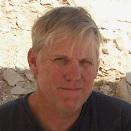Page 25 • (2,806 results in 0.038 seconds)
-
, Sociology & Criminal Justice, and the Master of Fine Arts in Creative Writing. The Individualized Major and interdisciplinary programs including Chinese Studies, Gender, Sexuality & Race Studies, Global Studies, Holocaust & Genocide Studies, Native American & Indigenous Studies, and Publishing & Printing Arts minor also reside in the college. Programs in the College of Liberal Studies engage students in the critical study of human existence and social systems across diverse cultures, time periods, and
College of Liberal Studies253-536-5132Hauge Admin Building - Office 222 B Xavier Hall - Office 152, Suite 155 Tacoma, WA 98447 -

Donald Ryan Faculty Fellow Phone: 253-538-5664 Email: ryandp@plu.edu Office Location:Hauge Administration Building - Room 220 L Website: http://community.plu.edu/~ryandp/ Professional Biography Personal Education Ph.D., Archaeology, Union Graduate School, The Union Institute , Cincinnati, Ohio, 1988 M.A., Anthropology (Archaeology), University of Washington, 1982 B.A., Political Science (International Relations), Pacific Lutheran University, 1979 Selected Publications Biography Donald P. Ryan
-
PLU Program Outcomes Self-Reflection is a formal paper that adheres to the professional writing standards of APA. Grading rubrics are provided in the resources sections of the Learning Management Systems (Sakai and Canvas) in the designated courses at the beginning and end of the programs of study. Reflection: The Program Outcomes Self-Reflection paper should demonstrate the ability of the student to reflect on their progress through the curriculum and demonstrate their growth within each program
-
PLU Program Outcomes Self-Reflection is a formal paper that adheres to the professional writing standards of APA. Grading rubrics are provided in the resources sections of the Learning Management Systems (Sakai and Canvas) in the designated courses at the beginning and end of the programs of study. Definitions Reflection: The Program Outcomes Self-Reflection paper should demonstrate the ability of the student to reflect on their progress through the curriculum and demonstrate their growth within
-
tenses (passé composé, imperfect, and plus-que-parfait) Chapters 6-10 of HorizonsNovice High: I can present personal information about my life and activities, using simple sentences most of the time. FREN 201Review of present and past tenses; question formation; object pronouns (le vs. lui) relative pronouns (que, qui, lequel, etc.) Chapters 1-5 of ImaginezIntermediate Low: I can express, ask about, and react with some details to preferences, feelings, or opinions on familiar topics, by creating
-

negative reactions she received, Dr. Shanks Kaurin is still willing to engage with a broader audience online. In widening her audience to Newsweek readers, Dr. Shanks Kaurin considers the accessibility of philosophical writing. “I think academic philosophy is filled with bad writing,” Dr. Shanks Kaurin says, “[Philosophers] are writing to just a few other people and there’s a lot of jargon.” But Dr. Shanks Kaurin is careful to not fall into that trap. She says, “I try to aim for a well-educated, lay
-
7:00-8:00 p.m. | April 15, 2024 | AUC CK Hall Room 214The Beautiful Mind: A Journey from Thought to PageNew York Times Bestselling author, Tami Charles, discusses the path of a story–how it often begins with a single thought and navigates to a destination of empowerment for both storytellers and readers alike.About the SpeakerTami Charles is an award winning and New York Times bestselling author of children’s, middle grade, and young adult books. Before turning to full time writing, Tami was a
-

intends to do just that by building the perfect meeting place — providing those students with a one-stop shop for individualized academic and personal support resources that’s packaged together in one warm, inviting study space. The Center is based in Mortvedt Library, the intellectual hub of the university. After taking a quick left going through the library’s main entrance, the first impressions of the new space are light and openness. A check-in desk sits before four small reservable rooms
-
and personal support resources. According to Kris Plaehn, the center’s Executive Director, that was an intentional part of the Center’s design process. “It’s flexible space — we want students to see where the support (systems) are,” Plaehn said. “(We wanted) to build open space that students can configure however they want to. You can make an appointment with a research librarian, the writing center, a language tutor, any sort of academic assistance tutor, an academic advisor or reserve one of
-
order to present a more robust illustration of learning, assessment should reflect the levels of knowledge, abilities and educational experiences of students and their learning conditions, as well as demonstrate clear respect for the disciplinary distinctions present on a Liberal Arts Campus.2. Assessment is goal oriented.University mission, disciplinary specificities, course design and students’ professional and personal goals all contribute towards educational goals and outcomes. Having clear
Do you have any feedback for us? If so, feel free to use our Feedback Form.


